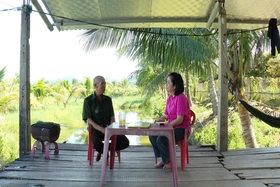{title}
{publish}
{head}
What does “clean coffee” truly mean? For Bich Chi, a young Vietnam Airlines flight attendant, the answer wasn’t found in books or cafés, but in the soil. Drawn to the quiet hills of Huong Phung, a border commune in Quang Tri’s Huong Hoa District, she rolled up her sleeves and began growing her own beans. From this land, Cup’n’Care was born - her dream to share Vietnamese organic coffee with the world.
A connection to the land of fire
It took several attempts to meet Bich Chi in Quang Tri. Her days were a whirlwind of flight schedules and farm duties, split between the skies and the soil. When we did sit down, inside a modest hillside house in Xa Ry village, Huong Phung commune, she greeted me not just with words, but with two steaming cups of coffee. One was Arabica, the other Liberica, both grown organically on her own land. The aroma alone spoke volumes about the journey she’s chosen.

Bich Chi prepares a cup of specialty organic coffee, cultivated on her own farm in Quang Tri, to warmly serve her guests – Photo: Quang Hai
Born in 1985 in Hanoi, Bich Chi’s path to coffee began in late 2019, with a simple idea: installing coffee vending machines in hospitals. But sourcing quality beans turned out to be more difficult than she expected. None of the suppliers she met could truly prove their coffee was “clean.”
“As a person with no background in coffee,” she recalled, “I realized that if I didn’t grow and process it myself, how could I ever be sure what clean coffee really is?”
Through her research, Bích Chi uncovered a troubling reality: many farmers were locked in a cycle of quantity over quality, pushing for maximum yields, relying heavily on chemical fertilizers, and rushing the drying process, all at the expense of the coffee’s true character. Meanwhile, most roasters treated green beans as a commodity, engaging in minimal processing and overlooking the deeper value within each harvest.
Confronted with this fragmented chain, Bích Chi made a bold decision: to begin anew, immersing herself in every stage of the coffee journey, from cultivation to processing and roasting, with care and respect.
As she traveled across Vietnam’s Arabica-growing regions, she deliberately chose Quang Tri, where is a land shaped by war and weathered by hardship, yet steadfast and enduring - over more established areas like Son La or Cau Dat in Dalat. Through a friend, she found a plot in Huong Phung, where a dedicated farmer, Uncle Binh, agreed to join her in building an organic coffee farm.
Selling value, not just coffee
Bich Chi’s path to entrepreneurship was far from easy. Her first batches of coffee trees withered, unable to adapt to the new soil. Refusing to give up, she and Binh patiently propagated new seedlings on-site, restoring the land using organic fertilizers made from fish, pineapples, and other natural materials, laying the groundwork for a sustainable coffee farm.
However, growing coffee was only the beginning. Bich Chi immersed herself in learning how to process, ferment, and roast coffee, believing that real value lies not in raw beans but in the final product, where quality and story combine to create competitive advantage. "Raw materials always sell for the lowest price. True value only comes when you control the entire product chain," she explained.
Although Vietnam stands as the world’s second-largest exporter of coffee, the majority of its beans are still shipped abroad in raw form. After more than two decades traversing the globe as a flight attendant, Bich Chi began to notice a troubling absence that Vietnamese coffee was rarely seen on the shelves of major international supermarkets, its rich heritage and unique flavor profiles largely invisible to the world. Determined to change the narrative, she founded Cup’n’Care, a specialty coffee brand with a heartfelt mission: to build a specialty coffee brand that truly represents Vietnam.
Beyond farming and basic processing, Bich Chi focused especially on deep fermentation, a process that could take up to five months - to unlock the full potential of each coffee bean. “Trying to sell one kilogram of Quang Tri coffee for $80 -120 is very difficult,” she admitted. "But I’m willing to go slowly. I’m not selling just coffee. I’m selling the value behind it."
From Quang Tri to the world
In 2022, Cup’n’Care entered the VietNam Amazing Cup for the first time and won the award for Most Popular Arabica Coffee. It was also the only Vietnamese brand featured among the top 20 coffees at the Pacific Rim Coffee Summit.
Not stopping at the domestic market, Bich Chi successfully exported Cup’n’Care’s Liberica coffee to South Korea, now sold in two cafés in Seoul. Roasters from Japan and South Korea have also purchased her green beans at premium prices of about $45 - 50 per kilogram, although she produces only a few hundred kilograms annually.
In March 2024, she organized a Liberica coffee processing workshop in Huong Phung, inviting expert Hoang Van Thanh to train local farmers. The event boosted confidence in Quang Tri’s coffee potential, and within a year, the price of Liberica cherries tripled.
A Japanese customer, after sampling Cup’n’Care coffee, has recently purchased 5 kilograms at several million dong per kilogram.For Bich Chi, building a specialty coffee brand is not about mass production, but about creating value for customers who truly appreciate it. “My dream is that when people think of Vietnamese organic specialty coffee, the first name they think of will be Quang Tri,” she shared.
Bich Chi’s journey is not just about business. It is a story of love and commitment to Huong Phung, a place where she feels a deep, destined connection. Through every organically grown tree and carefully processed bean, she is helping Quang Tri build sustainable agriculture and secure a place on the world map of specialty coffee.

Nguyen Thi Bich Chi, a young woman from Hanoi (pictured holding a baby), found her calling in Quang Tri and is now pursuing her dream of putting the region’s specialty coffee on the world map – Photo: Courtesy of the character.
Cup’n’Care is more than just a brand. It is a dream, a belief, and a testament that Vietnamese hands can produce world-class agricultural products, authentic, distinctive, and proudly ready for the global market.
Quang Hai - Tung Lam

QTO - Not letting summer slip by in vain, many students in Quang Tri have taken the initiative to teach English to younger children. Through each lesson,...

QTO - Returning from the northern border front with a 2/4 disability, it seemed his journey of service had come to an end. Yet, this wounded soldier began...